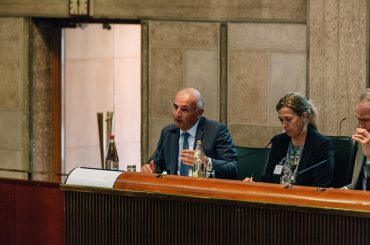Interview with Pauline Mispoulet, president of GESEC (Groupement Economique, Sanitaire, Electricité)
Interview with Pauline Mispoulet, president of GESEC (Groupement Economique, Sanitaire, Electricité) – a nationwide network of 300 small to medium sized French companies working in the heating, air conditioning and ventilation, electricity, plumbing and sanitary sectors.
When and why was GESEC founded?
GESEC goes back a long way: it was founded 45 years ago, when it became clear that the construction sector mainly consisted of small businesses – artisans, as it were -, with 96% of construction firms employing less than 10 people. It also became apparent that small tradesmen wanting to expand their businesses, were faced with technical, regulatory and managerial difficulties and often found themselves at a loss of how to move forward. A great tradesman will not always know a whole lot about management and marketing or other seemingly unrelated topics. This is why GESEC was created, to help tradesmen and women working in the construction sector to adapt and grow by providing them with a range of services they might need.
Furthermore, small businesses cannot afford to employ legal or marketing expertise unless they pool their resources. Today GESEC brings together a wide spectrum of expertise, including the whole range of back office support services that can be found in large companies: management, human resources, technical and legal support, strategy and public relations etc.
What does GESEC do?
Our daily operations also consist of consolidating experience, which is a crucial aspect of what we do. GESEC is a platform for the exchange of good practices and ideas, as well as lessons learnt from previous failures. This makes entrepreneurs feel more secure and saves them a lot of time.
Our network facilitators on the ground assess the needs of our members and share knowledge, while numerous GESEC meetings allow for frequent interaction.
The third thing we pool is clients themselves. Client purchasing behaviour has changed in significant ways, and this is true of households and tertiary clients alike.
We have been pursuing a commercial strategy aimed at both households and tertiary clients, following a large accounts approach which allows us to cater to clients with nationwide needs. In other words, we provide the advantages of a large company without the disadvantages related to corporate inertia. GESEC is a sort of one-stop shop offering advanced technical expertise and optimal reactivity to its clients’ needs.
In short, our job is to pool resources for the 300 businesses that make up our network. Our goal is to expand into geographic areas and trades where our presence has been limited so far, in the electricity business for instance. However, our principal aim is to be the network of reference across the sectors we represent. We prioritize quality over quantity and thus do not seek to maximize the number of network members at all costs.
What would you say are the common challenges facing SMEs in the industry?
All entrepreneurs are faced with similar issues and share the same concerns, from cash flow to productivity, social questions and the challenges brought about by the digital era.
There is a lot of commonality between the sectors, the challenges posed by the energy transition affect electrical installers as much as the heating and water management trades. Today, gas and electricity professionals are working together on this issue.
We strive to include a greater variety of businesses in our operations, including all kinds of innovative companies with an open approach to all aspects of the energy transition.
What does GESEC make of the energy transition?
The energy transition has been one of my priorities since becoming president of the network. It lies at the very core of our members’ business operations. We have seen many energy transitions over the last 150 years: namely the shifts from wood to coal, from coal to gas and from gas to electricity. Now we must find the best way of managing the upcoming transition. It represents a major technical, commercial and strategic challenge.
The role of various players has changed in fundamental ways. We have worked hard on helping them to reposition themselves and have been sharing our knowledge on the energy transition for almost ten years.
At the end of last year, I published a book in which I present my take on this topic. It is entitled “Energie et prospérité, les entrepreneurs au cœur de la transition” (Energy and prosperity, the central role of entrepreneurs in the energy transition). In this book I try to help readers gain a clear insight into this complex issue, and I believe it is an unfinished task as our whole sector could benefit from a better understanding of what is at stake when it comes to the energy transition.
What is the main message in your book?
The main message is this: the energy transition is an opportunity and not a threat. It is not just an environmental issue, but above all an economic issue, and if you think solutions are going to be handed to you from the top down, then you could be waiting a long time. It is up to every one of us to make the energy transition happen, especially given that technical solutions are readily available and it is in our interest as societies not to wait, postpone nor delegate this critical undertaking.
Could you tell us about any current projects led by GESEC or its partners?
We have several projects underway in 2015. One deals with digital technologies, which have become pervasive across the economy and particularly in our sector. It is an extremely important area of focus for us, and this is going to translate into practical achievements in 2015. Another one of our projects deals with technical innovation: two years ago we partnered with Boostheat, a company founded by two engineers who designed a thermodynamic boiler. A third project consists in setting up an investment fund that facilitates the transfer and takeover of independent businesses. We believe it is indeed crucial to strengthen the economic independence of our members in the face of large corporations.
Could you tell us about one of your partnerships?
We have been teaming up with Rexel for several years. We struck this mutually beneficial partnership with Patrick Berard, senior vice-president for Europe. Rexel, a leader in electrical supplies, has by definition a strong presence in the electricity sector, whereas we have developed many activities in the plumbing sector. By working together, Rexel can build its strategic presence in the heating and air-conditioning sector, while helping us to enhance our own presence in the electricity sector. We have met each other half way, so to speak, and we are glad to say that Rexel has become one of our major partners and that we share a common vision of the future of our industry.



